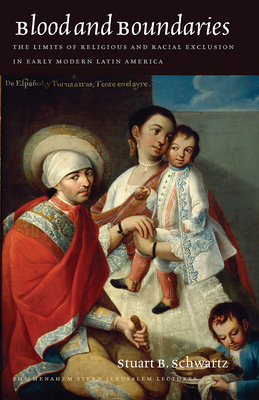

 Brandeis University Press
Brandeis University Press
Blood and Boundaries: The Limits of Religious and Racial Exclusion in Early Modern Latin America


Key Metrics
- Stuart B Schwartz
- Brandeis University Press
- Paperback
- 9781684580200
- 8.4 X 5.5 X 0.7 inches
- 0.6 pounds
- History > Latin America - South America
- English
 Secure Transaction
Secure TransactionBook Description
In Blood and Boundaries, Stuart B. Schwartz takes us to late medieval Latin America to show how Spain and Portugal's policies of exclusion and discrimination based on religious origins and genealogy were transferred to their colonies in Latin America. Rather than concentrating on the three principal divisions of colonial society--Indians, Europeans, and people of African origins--as is common in studies of these colonial societies, Schwartz examines the three minority groups of moriscos, conversos, and mestizos. Muslim and Jewish converts and their descendants, he shows, posed a special problem for colonial society: they were feared and distrusted as peoples considered ethnically distinct, but at the same time their conversion to Christianity seemed to violate stable social categories and identities. This led to the creation of cleanliness of blood regulations that explicitly discriminated against converts. Eventually, Schwartz shows, those regulations were extended to control the subject indigenous and enslaved African populations, and over time, applied to the growing numbers of mestizos, peoples of mixed ethnic origins. Despite the efforts of civil and church and state institutions to regulate, denigrate, and exclude, members of these affected groups often found legal and practical means to ignore, circumvent, or challenge the efforts to categorize and exclude them, creating in the process the dynamic societies of Latin America that emerged in the nineteenth century.
Author Bio
Professor Schwartz, who received his Ph.D. from Columbia in 1968, specializes in the History of colonial Latin America, especially Brazil and on the history of Early Modern expansion.
Among his books are Sovereignty and Society in Colonial Brazil (1973), Early Latin America (1983), Sugar Plantations in the Formation of Brazilian Society (1985), Slaves, Peasants, and Rebels (1992), as editor, A Governor and His Image in Baroque Brazil (1979), Implicit Understandings (1994), Victors And Vanquished: Spanish and Nahua Views of the Conquest of Mexico (2000), Cambridge History Of Native Peoples Of The Americas. South America (1999), and All Can Be Saved: Religious Tolerance and Salvation in the Iberian Atlantic World (2008).
He is presently working on several projects: a history of independence of Portugal and the crisis of the Iberian Atlantic, 1620-1670; and a social history of Caribbean hurricanes.
Research Interests
Latin American history; Brazil
Source: Yale University, Department of History
Videos






Community reviews
Write a ReviewNo Community reviews